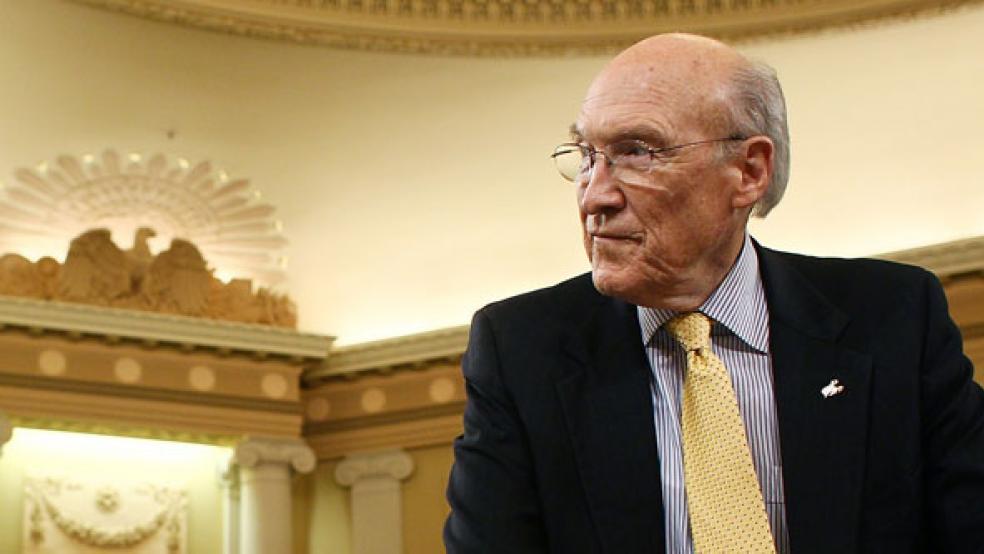The failure of the congressional Super Committee has former Sen. Alan Simpson fuming. Simpson, who along with Erskine Bowles authored an ambitious deficit-reduction plan largely ignored by President Obama and Congress, warns, “The people who sat on their butts and pandered to the American people will lose the election in November 2012, which could be the greatest thing that could ever happen.”
Simpson, the outspoken former Republican Senator from Wyoming, did not hold back in an interview with The Fiscal Times. He said that failure to reach an agreement on how to reduce the deficit by $1.2 trillion over the next decade will put the country into a “deep funk,” and there is no telling when the U.S. could hit its credit limit. And, he adds, there is little hope to crawl out from under the national $15 trillion mountain of debt without spending cuts and tax hikes. “I’ll tell you it was sad to watch,” Simpson says. “Good thoughtful people of both parties just sat there in their rigid, concrete boots, Al Capone like.”
After months of negotiations, the 12-member bipartisan Super Committee couldn’t move past their ideological differences over taxes and entitlements. Democrats insisted cuts to entitlements be tied to tax hikes. Republicans refused to include revenues in a deficit-reduction package. As a result, automatic, across-the-board budget cuts totaling $1.2 trillion will be triggered in January 2013.
Simpson, 80, said the proposal he and Erskine Bowles issued would not go away because it was very specific. “We knocked over every sacred cow in the field. You will never get it into legislative language but you could pull it up for a vote and just say look, this is a plan.”
The controversial Bowles-Simpson proposal cut $4 trillion in deficit spending over the coming decade. Besides slashing spending and closing tax loopholes, it eliminated other expensive tax breaks long enjoyed by the middle class.
“You don’t have to call it a tax increase,” says Simpson, whose colorful language sometimes gets him into trouble. “Let’s get honest. Just dig in to the $1.1 trillion in loopholes and tax expenditures. Those are spending by any other name. They are earmarks by any other name. For most of those babies it’s often a tax decrease.”
The fiscal commission didn’t receive enough votes from its own members to send to Congress for a vote. By many accounts the plan, which served as a framework for those seeking a long-term deal, was largely ignored by President Obama and Congress.
On Monday, Fitch Ratings, one of the three major rating agencies that assess a country's ability is to repay its debt, cut its U.S. outlook to negative, citing a lack of confidence in the federal government's commitment to taking the necessary steps to rein in the deficit. Simpson says the only way to get the “rating agencies off our fanny” is to produce a plan, even if it has flaws in it. “Call it anything you want—America’s Path Forward, The Moment of Truth, The Austerity Plan,” he says. If the rating agencies take a drastic move to downgrade the U.S. credit again, inflation and interest rates will go up, he warns.
Social Security Strategy
Looking back over the last year of budget negotiations, Simpson says he and Bowles thought one of the easiest issues for Congress to tackle was to restore solvency to the Social Security system for 75 years. The nonpartisan Congressional Budget Office projects the program’s trust fund is dwindling and will hit zero by 2037 as baby boomers retire and applications for benefits increase. This year, Social Security will pay out $45 billion more in retirement, disability, and survivors’ benefits than it recoups in payroll taxes.
“We set it out very specifically,” Simpson says. “I mean, hell, the average age now is 78.1. It will be 80 in another five years. We thought surely people of good will and clean thoughts will buy this and take care of the little guy.” The Bowles-Simpson plan took heat for its recommendation to trim the annual cost of living for Social Security recipients and gradually boost the retirement age to 69. Simpson says Social Security should not be dealt with separately, as the White House has insisted.
“The AARP and Grover are running the show. As soon as the American people figure that out, they ought to cancel their subscriptions.”
Both parties are at fault for failed deficit negotiations over the past year, but primarily Simpson blames lobbying pressures. On the left, he singles out the 40 million-member AARP, the largest lobbying organization for older Americans in the nation’s capital. And on the right he points his finger at Grover Norquist, president of the lobbying group Americans for Tax Reform. Since the Super Committee collapsed, Norquist has become a controversial figure in Washington, blamed for holding a sword of Damocles over Republicans not to break ATR’s no-new tax pledge.
“The AARP and Grover are running the show,” Simpson says. “As soon as the American people figure that out, they ought to cancel their subscriptions, tell them to go back to the drawing board, and try to use common sense to try and get America out of this hole.”
In the last few months, Simpson and Bowles have toured the country to spread the word that a deficit-reduction package needs to include spending cuts and tax hikes. They are possibly the only high-profile duo in America that receives standing ovations from both the right and left for talking about the deficit. “We don’t do bullshit or mush,” Simpson says. “People are thirsting for that.”
“[The American people] know that if you spend a buck and borrow $0.42, you gotta be stupid. And if you spend more than you earn, you’re going to lose your butt,” he says.





